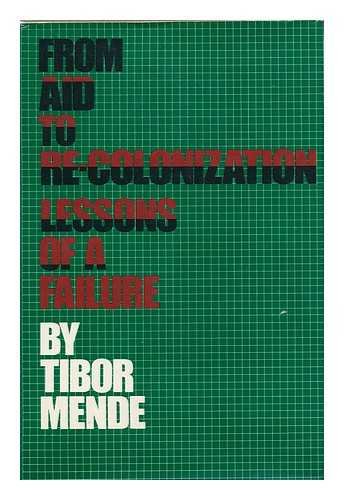aid re colonization lessons failure di tibor mende (7 risultati)
FeedbackFiltri di ricerca
Tipo di articolo
- Tutti i tipi di prodotto
- Libri (7)
- Riviste e Giornali (Nessun altro risultato corrispondente a questo perfezionamento)
- Fumetti (Nessun altro risultato corrispondente a questo perfezionamento)
- Spartiti (Nessun altro risultato corrispondente a questo perfezionamento)
- Arte, Stampe e Poster (Nessun altro risultato corrispondente a questo perfezionamento)
- Fotografie (Nessun altro risultato corrispondente a questo perfezionamento)
- Mappe (Nessun altro risultato corrispondente a questo perfezionamento)
- Manoscritti e Collezionismo cartaceo (Nessun altro risultato corrispondente a questo perfezionamento)
Condizioni Maggiori informazioni
- Nuovo (Nessun altro risultato corrispondente a questo perfezionamento)
- Come nuovo, Ottimo o Quasi ottimo (Nessun altro risultato corrispondente a questo perfezionamento)
- Molto buono o Buono (6)
- Discreto o Mediocre (Nessun altro risultato corrispondente a questo perfezionamento)
- Come descritto (1)
Legatura
- Tutte
- Rilegato (7)
- Brossura (Nessun altro risultato corrispondente a questo perfezionamento)
Ulteriori caratteristiche
- Prima ed. (1)
- Copia autograf. (Nessun altro risultato corrispondente a questo perfezionamento)
- Sovracoperta (4)
- Con foto (1)
- Non Print on Demand (7)
Lingua (2)
Prezzo
- Qualsiasi prezzo
- Inferiore a EUR 20
- EUR 20 a EUR 45
- Superiore a EUR 45 (Nessun altro risultato corrispondente a questo perfezionamento)
Spedizione gratuita
- Spedizione gratuita in Italia (Nessun altro risultato corrispondente a questo perfezionamento)
Paese del venditore
Valutazione venditore
-
From Aid to Re-Colonization: Lessons of a Failure
Da: Presidential Book Shop or James Carroll, Alexandria, VA, U.S.A.
Prima edizione
EUR 5,26
Convertire valutaEUR 12,34 per la spedizione da U.S.A. a ItaliaQuantità: 1 disponibili
Aggiungi al carrelloCloth. Condizione: Very Good. Condizione sovraccoperta: Poor. First Edition. xxx, 317 p. The author contends that aid policies of the advanced industrialized nations have failed - that was how it looked in 1973.
-
EUR 14,10
Convertire valutaEUR 9,91 per la spedizione da U.S.A. a ItaliaQuantità: 1 disponibili
Aggiungi al carrelloHardcover. Condizione: Good. No Jacket. Former library book; Pages can have notes/highlighting. Spine may show signs of wear. ~ ThriftBooks: Read More, Spend Less 1.55.
-
From Aid To Re-Colonization Lessons of a Failure.
Editore: NY pantheon., 1973
Da: The Compulsive Collector, New York NY, NY, U.S.A.
EUR 22,80
Convertire valutaEUR 14,47 per la spedizione da U.S.A. a ItaliaQuantità: 1 disponibili
Aggiungi al carrelloHardcover. Condizione: Very Good. cloth hard cover 8vo. 317 PP very good Copy in Very good dust jacket.
-
EUR 23,22
Convertire valutaEUR 29,80 per la spedizione da U.S.A. a ItaliaQuantità: 1 disponibili
Aggiungi al carrelloHardcover. Condizione: Very Good.
-
EUR 38,95
Convertire valutaEUR 13,95 per la spedizione da Irlanda a ItaliaQuantità: 1 disponibili
Aggiungi al carrelloFirst American Edition. Fine cloth copy in an equally fine dw. Particularly and surprisingly well-preserved; tight, bright, clean and especially sharp-cornered. ; 317 pages; Physical desc. : xxix, 317 p ; 22 cm. Subject: Economic assistance --International economic relations. 2 Kg.
-
EUR 6,14
Convertire valutaEUR 51,08 per la spedizione da U.S.A. a ItaliaQuantità: 1 disponibili
Aggiungi al carrellohardcover, Condizione: Very Good, Pantheon NY c.1973, stated 1st. but code #2, 8vo. hardcover, 317pp. VG/VG $.
-
EUR 6,14
Convertire valutaEUR 51,08 per la spedizione da U.S.A. a ItaliaQuantità: 1 disponibili
Aggiungi al carrellohardcover, Condizione: Very Good, Pantheon NY c.1973, stated 1st. but code #2, 8vo. cloth, 317pp. ex-lib.- sp label, bkplte., pocket, stamps, VG/VG $.




